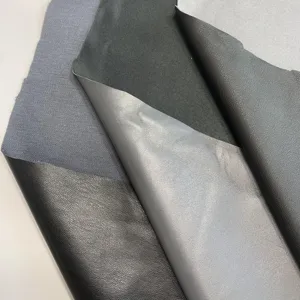
All categories
Featured selections
Trade Assurance
Buyer Central
Help Center
Get the app
Become a supplier

(61239 products available)



















































Textile shoe materials come in various types, each offering different characteristics and benefits. These materials are chosen based on their suitability for different shoe designs and purposes.
Cotton is a versatile and widely used material in textile shoes. Renowned for its softness, breathability, and ease of care, it is often found in casual and lightweight footwear. The natural fibers of cotton ensure that shoes are comfortable for everyday wear.
Canvas, a heavy-duty cotton fabric, is popular in the production of casual shoes and sneakers. The durability and stiffness of the canvas make it ideal for maintaining the shape of such lightweight and robust footwear. Also, it can be easily cleaned and is relatively inexpensive. This adds value to its applications in everyday and outdoor footwear.
Nylon, a synthetic fiber, is commonly utilized in lightweight and water-resistant textile shoes. Its strength, elasticity, and resistance to abrasion make it important for athletic and outdoor footwear. Additionally, nylon can be blended with other fibers to enhance texture and performance properties like moisture wicking and quick drying.
Polyester is frequently used due to its durability, resistance to wrinkling, and quick-drying properties. In many cases, it is used in combination with other materials to strengthen outdoor and athletic shoes. Besides, the dyeability of polyester allows for vibrant, long-lasting colors in shoe designs.
Lastly, elastane, known for its exceptional elasticity, is often blended with other materials. It provides shape retention and flexibility. This is ideal for shoes that need to stretch and conform to the feet, such as sports footwear or slip-ons. Moreover, it enhances comfort and fit without compromising mobility or shape.
The keyword shoes for textiles have many distinguishing features. They include durability, breathability, and design versatility.
Textile shoe materials are used in many industries other than footwear manufacturing. They include sporting goods, automotive, and healthcare. This expands their utility beyond shoes.
The sporting footwear industry widely uses textile materials. These materials offer lightweight, flexibility, and breathability. They include running shoes, hiking boots, and athletic sandals. In the athletic footwear industry, textile materials include breathable meshes and moisture-wicking fabrics. They help to keep the feet dry and regulate their temperature during intense workouts. Outdoor footwear also relies on durable textiles like reinforced nylon to withstand harsh outdoor conditions.
Textile materials are also vital in outdoor gear and equipment manufacturers. They make tent-cli, tarps, backpacks, and outdoor clothing. Polyester and nylon are particularly popular for their durability and water-resistance capabilities in outdoor footwear. They frequently endure harsh situations like hiking, camping, or climbing. These shoes are made with lightweight yet robust textile materials. They provide the necessary protection from the environment without adding weight to the wearer.
In the automotive sector, textile shoe materials are used in manufacturing car interiors. These include seat covers, carpets, and upholstery. The versatility of textile materials adds comfort and style to automobile interiors. Footwear manufacturing relies on durable and aesthetically pleasing fabrics. They are extensively used to make automotive textiles.
In the healthcare industry, textile shoe materials are used to produce medical-grade footwear. These shoes require comfort, support, and easy cleaning. They are crucial for healthcare professionals working long shifts. They prioritize durability and hygiene. Lastly, textile shoes are also widely used in the manufacturing of slippers.
Choosing the right textile shoe material requires buyers to consider several key factors. These are durability, breathability, and water resistance.
Breathability in shoe fabrics is vital for comfort. It prevents moisture buildup. This keeps feet dry and reduces odor. So, it makes shoes feel fresher and more comfortable, especially during physical activities.
Textile shoes are generally lighter than leather shoes. However, advanced textiles like nylon can be as durable as leather. Also, some textile materials have been reinforced to improve durability. For example, Cordura fabric is treated to improve its durability so it can be used in heavy-duty applications.
Yes, there are many eco-friendly options. They include organic cotton and recycled polyester. Recently, many brands have started using them to contribute to sustainability.
Buyers should request material samples of finished products to assess quality first-hand. Also, they need to check if the manufacturer has certifications like ISO. This will confirm their commitment to quality and sustainability.